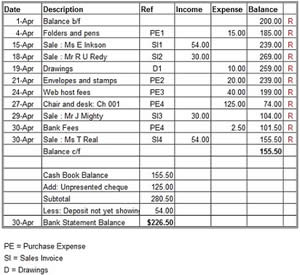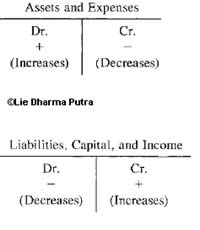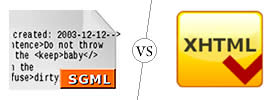Difference between Single-entry and Double-entry in Bookkeeping
Key Difference: Single-entry system of bookkeeping requires inputting the entry only once in either the credit column or the debit column. Double-entry system requires putting one entry twice, once in the credit column and once in the debit column of another account.
Single-entry bookkeeping and double-entry bookkeeping are two methods of data recording when maintaining financial accounts. Bookkeeping plays a huge part in accounting as the entries are used from bookkeeping to create the different accounting statements.
Bookkeeping is an activity that is a small part of accounting and the Finance Department. Bookkeeping is the process of recording daily activities of the business, including receipts, payment, purchases, sales and expenditure. A bookkeeper is usually hired in medium to large companies that is responsible for recording these transactions. Bookkeeping is considered as a small part of accounting. Accounting uses these books in order to create the financial statements. Bookkeeping involves recording each and every transaction that happens in the day, which is then tallied at the end of the day and the end of the month. This is to see if the figures tally with the amount that is earned or spent by the company. Bookkeeping is done with the help of ledgers, account books, cash books, etc. Originally bookkeeping was done in a book, that is where the name comes from, but now it is done on various different programs on the computer. There are two methods of entering data in bookkeeping: Single-entry bookkeeping and double-entry bookkeeping.
 Single-entry system of bookkeeping requires inputting the entry only once in either the credit column or the debit column. This method is most commonly used for small businesses that only want to record the bare-essentials such as cash, accounts receivable, accounts payable, etc. This type of system is considered as inadequate unless the business transactions are very simple and the volume is very low. Single-entry requires the person keep a single journal or book where all the debit and credit are allocated. The book is then divided into two columns: credit column and the debit column. The credit column is marked for any money that is incoming, while the debit column is for any money that is going out. The two columns are maintained and then tallied at the end of the month to see how much profit is earned or loss is sustained or where the money is allocated. Single-entry system is beneficial for small businesses that do not have to worry much about assets, large number of employees, etc.
Single-entry system of bookkeeping requires inputting the entry only once in either the credit column or the debit column. This method is most commonly used for small businesses that only want to record the bare-essentials such as cash, accounts receivable, accounts payable, etc. This type of system is considered as inadequate unless the business transactions are very simple and the volume is very low. Single-entry requires the person keep a single journal or book where all the debit and credit are allocated. The book is then divided into two columns: credit column and the debit column. The credit column is marked for any money that is incoming, while the debit column is for any money that is going out. The two columns are maintained and then tallied at the end of the month to see how much profit is earned or loss is sustained or where the money is allocated. Single-entry system is beneficial for small businesses that do not have to worry much about assets, large number of employees, etc.

Double-entry system requires putting one entry twice, once in the credit column and once in the debit column of another account. This is done to ensure that no entries are accidently missed. It is also an easier way to tally the accounts. Double-entry rules were first codified in the 15th century by Franciscan Friar, Luca Pacioli. A simple accounting equation was also established to determine if there are any errors in bookkeeping. The equation states: Equity = Assets – Liabilities. At any point if the two sides of the equations do not tally, then the bookkeeping has an error. Double-entry bookkeeping requires the person to maintain a variety of different accounts. Any transaction that takes place must be marked in two different accounts. A debit in one account would be marked as a credit in another account. Double-entry helps record financial transactions for asset, liability, income, expense, or capital accounts. Double-entry also helps make accounting easier for preparing cash statements, profit and loss statements and for filing taxes.
|
|
Single-entry |
Double-entry |
|
Definition |
Single-entry system of bookkeeping requires inputting the entry only once in either the credit column or the debit column. |
Double-entry system requires putting one entry twice, once in the credit column and once in the debit column of another account. |
|
Duality |
Is not based on the concept of duality. |
Is based on the concept of duality. |
|
Accounts |
Maintains simple and personal accounts of debtors, creditors and cashbook. |
Maintains all personal, real and nominal accounts. |
|
Profit Or Loss |
Cannot help in making the company’s profit or loss statement. |
Can help in making the company’s profit or loss statement. |
|
Suitability |
Small businesses where transactions are small and simple. |
Big businesses and corporations that deal with complex transactions and huge inventories. |
|
Trial Balance |
Cannot prepare trial balance |
Can prepare trial balance |
|
Tax Purpose |
Is not acceptable for tax purposes. |
Is acceptable for tax purposes. |
|
Financial Position |
Cannot ascertain the true financial position of the business. |
Can ascertain financial position of the business. |
|
Advantages |
Simple, less-expensive, easier to manage, provides general view of earnings and expenditure. |
Complete data is available, provides an arithmetic check on bookkeeping, helps track debits and credits, can help ascertain the financial position of the business, makes it easier to produce year-end accounts. |
|
Disadvantages |
Incomplete data, are not able to provide a check against clerical error, does not record all transactions, does not provide a detailed record of assets, theft and loss cannot be detected. |
Expensive, harder to understand, requires hiring external staff and time-consuming. |
Image Courtesy: beginner-bookkeeping.com, accounting-financial-tax.com









Comments
gargantilla bulgari
Wed, 12/06/2017 - 02:14
AJ
Fri, 12/02/2016 - 13:36
Admiring the time and effort you put into your blog and in depth information you offer. It's good to come across a blog every once in a while that isn't the same old rehashed material. Great read! I've bookmarked your site and I'm including your RSS feeds to my Google account.
louis vuitton outlet
Sun, 10/26/2014 - 22:54
SERIOUSLY THIS HELP ME A LOT
NIMMI SHARMA
Fri, 09/05/2014 - 19:48
SO WONDERFUL
JAMES
Wed, 08/27/2014 - 11:30
this is amazing. helped me alot.
Purushottam
Mon, 05/12/2014 - 10:55
This note help me a lot..thnx very much
rani
Wed, 04/30/2014 - 10:23
'superb ' add thanks to upload
Ramesha AM
Thu, 04/10/2014 - 16:18
Add new comment